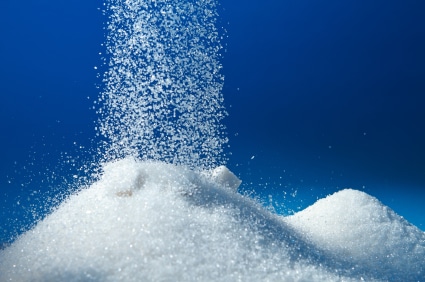The Ill Effects of Sugar
This CNN article highlights the health problems related to sugar. More and more is coming out about the ill effects of this sweet substance found every where in our diets. It is sugar, not fat that is responsible for the rise in obesity, heart disease, diabetes, and cancer. Gary Taubes exhaustively makes this point about sugar in his books, Good Calories, Bad Calories and Why We Get Fat.
Another crusader against sugar is Robert Lustig, MD who the CNN article mentions. Dr. Lustig is a pediatric endocrinologist who runs the obesity clinic at the University of California, San Francisco School of Medicine.
Do you have 90 minutes of uninterrupted time? If so, and if you want to be enlighten about the perils of sugar watch this lecture by Dr. Lustig called Sugar, the Bitter Truth which has gone viral. Take notes – your health depends on it.
He demonstrates how sugar, especially high-fructose corn syrup is similar, not only the way it is metabolized, but also in its effects on our health as is ethanol. That really should not be surprising since alcohol comes from sugar. But, most of us have never contemplated the significance of this relationship.
The sweet substance in its many forms is ubiquitous in our food supply. The increase in obesity almost parallels exactly the increase use of high-fructose corn syrup in our society. High-fructose corn syrup is sweeter than table sugar and cheaper. It is found in nearly all processed and frozen foods. One negative outcome of trying to remove fat from our diets and food supply is that it leaves food without much taste. Therefore, high-fructose corn syrup has been added to make foods tastier.
As the CNN article mentions sugar affects the natural hormones that tell our bodies we have had enough to eat. The hormone responsible for this is leptin. Leptin is adversely affected by sugar providing inadequate signal to tell the brain that we are full, and we therefore overeat.
In addition, sugar leads to excessive insulin levels. Insulin promotes fat storage, and hinders our ability to burn calories from our fat stores. To make matters worse, sugar is inflammatory raising the risk of heart disease and cancer.
What about Fructose in Fruit?
There’s a difference between high-fructose corn syrup added to food and naturally occurring fructose found in fruit and Dr. Lusting addresses this in his lecture. He says, first, the fructose in nature is a marker that a particular piece of food or fruit is high in other nutrients. Secondly, where fructose is found in nature there is adequate levels of fiber.
Fiber “neutralizes” the bad effects of fructose. Fiber must be removed from foods if they are to be frozen and shipped. Most of us have inadequate levels of fiber in our diets compounding the effects of high-fructose corn syrup added to processed foods.
Solution
Personally, I’m not a big fan of government regulation. Is it coincidental that the industries that are struggling the most today are the one’s most heavily regulated? I push for better education of not only the public, but for all those in health care professions.
Stay Tuned!
The ill effects of this sweetener on our health are many. And, it’s a rather complicated topic to address in a single article. JackoMD180 plans to devote a series of articles on the harmful effects of sugar on our health, as well as a book review on Why We Get Fat. But, since this CNN article was just published we thought it important to spend some time addressing it now.
Stay young!. Stay sugar free!
See related articles.
“Sweeteners: to Sweeten or not Sweeten”
“Sugar: the News Isn’t So Sweet”

